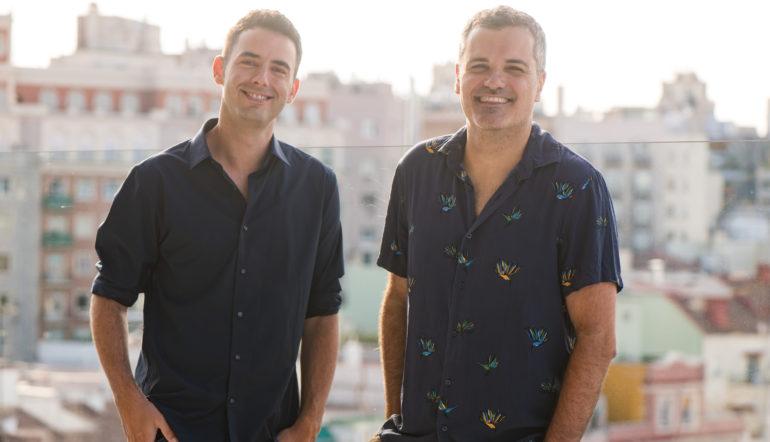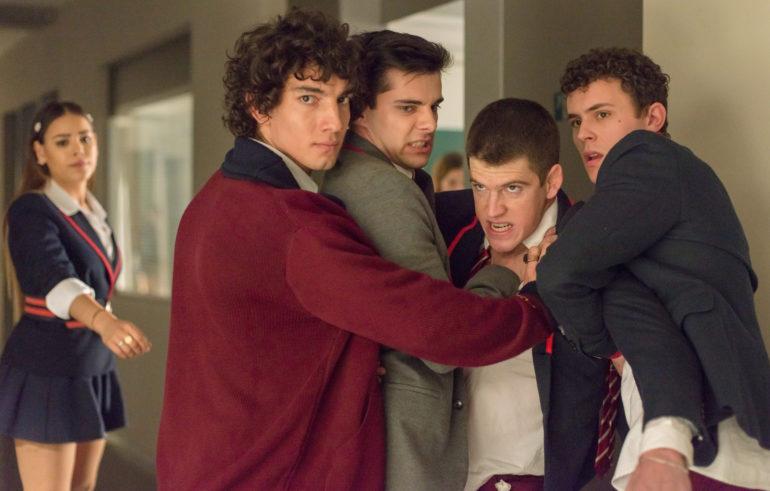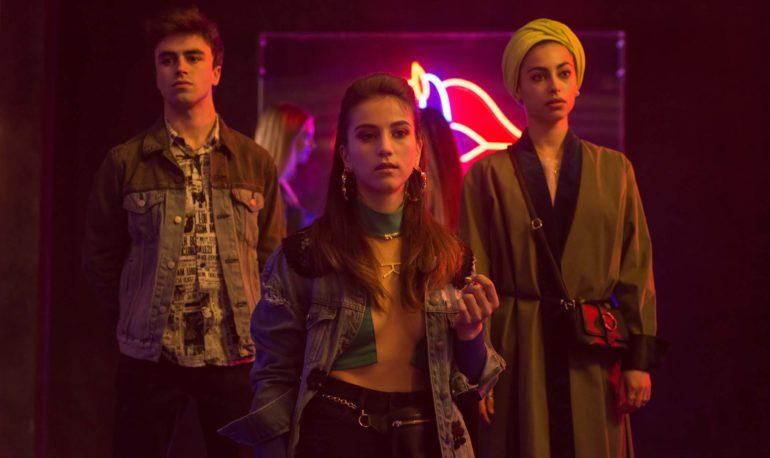Netflix’s ‘Elite’ Creators Carlos Montero, Dario Madrona Talk Class Warfare, Rosalia, Season 2
By Emiliano Granada
LOS ANGELES (Variety.com) – MADRID — Watched by over 20 million household accounts worldwide in its first month, Spanish high school series “Elite” is a striking example of the global potential of Netflix’s drive into local production.
At first glance, targeting a very specific audience, it explores multiple themes through multi-layered character relationships which appeal to far broader demographies.
These come courtesy of two young but seasoned show-runners, Carlos Montero (“Physics or Chemistry”) and Dario Madrona (“Vive cantando”).
After Season 1’s breakout – and now bulwarked for the second by another four writers plus the production values that brings to the table – they play confidently with both teen drama and procedural tropes, showcasing the new quality standards of Spanish drama series.
“” Season 2 allows for more formal flare and also time to explore in more depth the already established characters.
As Netflix confirmed an a third “Elite” season. Variety talked in late August with Carlos Montero and Darío Madrona about the show’s class warfare, flash-forwards, and new working class character Rebeca’s anesthetized “choni” looks: Big ear-loops, makeup, immaculate nails, tracksuits, short skirts, bare midriff.
As Sam Mendes pointed out, characters like James Bond are time-efficient since barely needing introduction. You’re playing with a established format that has that. But one danger’s character stereotyping. How did you try to avoid that?
Montero: We started, as you say, with archetypes. Especially in an ensemble series with so many characters, it’s good to know who’s who in minute one: the high-school jerk jock, the bad boy, and so on. But of course, that’s very boring. So you’re looking for twists from the get-go. We continue that in Season 2. Of the new students, Cayetana, the Internet influencer, is quickly taken to an extreme. [She doesn’t so much exaggerate] as become an out-and-out lier.
Madrona: The fun thing’s to take a character like [jock] Guzmán, one of whose hallmarks in Season 1 that he’s totally against drugs, and ask yourself: What would happen if, for personal reasons, he ends up taking cocaine? All the characters evolve in the second season, or we try to reveal other aspects of them. Everybody has a villain and a nice boy on the inside, even a murderer. The questions how they might get out.
The series maintains its flash-forward thriller structure, What were its challenges?
Montero: The fast forward was undoubtedly the biggest challenge. It’s a very complicated puzzle: You have to be always one step ahead. It has to be compelling, with twists, and yet understandable, but the audience should never feels completely lost.
Madrona: You have to know exactly where you’re going to finish up, and how the story’s going develop, and we need variants, otherwise it would get repetitive. But it mustn’t enslave you. This is not a series about crimes, even though they’re the thread line connecting other plots.
So the crime itself is something of a McGuffin?
Madrona: The essential thing’s the clash between social classes. That’s what sets the series apart. It makes the McGuffin less artificial because it’s born from that warfare, organic, not the crime of a random psychopath.
Montero: It’s interesting how characters take advantage of inequality; to rob, spice up their relationships or as a prop for rebellion. The way they use one another is ripe with drama. That differentiates “Elite” from the typical romance between a poor boy and rich girl with an overbearing father.
Season 2 showcases Spanish aesthetics, a certain look, for example, building on the music vid scene, Canadá’s work with Rosalía, for example. New student Rebeca looks, behaves as if she’s walked out of one of these videos.
Montero: Yes, we were influenced by Rosalía. We liked her aesthetic, the way she presents herself to the world with such confidence. Rebeca has a lot of that. Her family background pulls her down, but she doesn’t care. She’s who she wants to be. There is a Spanish aesthetic too, what we call “choni.” We wanted to introduce it to Las Encinas, because it wasn’t there before.
Madrona: It could have thrown the whole system out of synch. Luckily, Claudia [] is very subtle. Any other actress – and we tested a lot, – would have taken that to an extreme.
Elite handles themes, idiosyncrasies rooted in the Spanish culture….
Montero: We didn’t try to make a Spanish series nor for that matter an international one. But we show what we see. But we showed what you see, what is here for the world to see. Urban planning and construction, for example, can mean corruption. Being more local is a key.
Pop music is a constant throughout the series. Why?
Montero: It was the first time we had the opportunity to do it, mainly because of the budget. In other series we’ve worked on, we always aspired to have a song that we never got due to budget limitations. Here Netflix gave us has enough budge tto have a very strong music component.
Madrona: We have Lynn Fainchtein, who’s an incredible music consultant, has worked with Guillermo del Toro, with Cuarón, did “Roma,” recently. Music cuts two ways: It immerses spectators in a moment and mood. Songs can help us tell the story.We’ve had Cristina Rosenvinge and Vetusta Morla in the series, and groups we like but maybe aren’t that heard.
Given the success of Season 1, will you have a bigger budget for Season 3?
Madrona: Once a series has been a success you know that, yes, Netflix will spoil you more. But we already felt spoiled in Season 1. We want to be increasingly ambitious every season. We always had the idea of at least three seasons, which maintain the fast-forwards but aim higher and higher. Season 2 ends on a high, we think.
John Hopewell contributed to this article.



